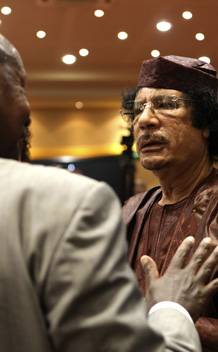Guest Post: AU Failure in Libya? Maybe Not
More on:

One of the vaunted accomplishments of the past decade has been the improvement of the African Union, but the fifty-four nation body appears to have stumbled over instability in Libya. However, the African Union’s marginalization in Libya deserves a closer look.
From the start, the African Union (AU) opposed an international intervention, insisting on “inclusive dialogue” between Libya’s opposition on the ruling regime of Colonel Muammar al-Qaddafi. Despite the policy of “nonindifference” and support for coercive intervention in situations of mass atrocities established by the African Union’s founding charter, the AU Constitutive Act, the AU’s kneejerk rejection of intervention held firm in the case of Libya.
The multilateral body called for negotiations between Qaddafi and the opposition, dispatching in April a delegation from five nations (including presidents of South Africa, Congo-Brazzaville, Mali and Mauritania, and Uganda’s foreign minister) to negotiate a peaceful settlement. They succeeded in earning Qaddafi’s approval for their proposed agreement, but the Libyan rebels promptly rejected the plan because it did not require Qaddafi to step down. Multiple other attempts by the AU to negotiate peace similarly failed. Months later, the African Union then declined to recognize the National Transitional Council (NTC) as the legitimate government of Libya after forty other nations did so (including the United States). Now, after the death of Qaddafi, the African Union’s response has been “muted,” with the majority of African leaders refusing to comment.
Criticism of the AU’s weak attempt at negotiations has been widespread. For example, Foreign Policy’s Joshua Keating argued the AU’s historical support for “ill-fated governments of national unity” undermined their negotiation efforts in Libya. But with the rebels emboldened by NATO air support, the AU was not given a chance to practice its bolstered “nonindifference” policy. For example, the former assistant secretary of state for public affairs, P.J. Crowley countered that the Libyan rebels should have accepted the plan, arguing that it would have forced the African Union to take more responsibility for Qaddafi’s actions.
Regarding the slow recognition of the NTC, the African Union is by no means the first multilateral organization to take its time before adopting a stance. The executive director of the Cape Town Center for Conflict Resolution, Adekeye Adebajo, notes that rather than “marginalized,” the AU was “divided.” In fact, Adebajo observes, “these splits mirrored the European Union’s own difficulties in responding to the Balkan conflicts in the early 1990s” as well as NATO’s internal discord over intervention in Libya. With officials admitting that NATO’s institutional memory in the Balkans contributed to the swift action on Libya, the AU’s failure to respond decisively may imply more that it is still growing sea legs, rather than spell doom for the institution.
Not to mention, one of the African Union’s institutional obstacles to action on Libya ironically stems from an effort to prevent military dictatorships and forceful seizures of power. Reuters’ Africa News blog explains:
The African Union’s Democracy Charter is also clear that those who takes [sic] power by force should be sanctioned not welcomed (although it could be interpreted that this applies to democratically elected governments, which Gaddafi’s certainly wasn’t). Hypocritical it may be for those African leaders who first took power by force to now insist that others should not do so, but the African Union has condemned coups and rebellions elsewhere and suspended countries until they held elections. That has undoubtedly helped make clear that taking power by force should not be the workaday means of changing government that it once was in Africa.
Furthermore, on the cash-strapped continent, leaders cannot be entirely blamed for their hesitance to condemn a significant benefactor and ally. Qaddafi invested $5 billion dollars in hotels, cell phones, mosques, and mining companies throughout Africa. Under Qaddafi, Libya also absorbed the AU dues of critically poor nations, contributing a full fifteen percent of the union’s budget. National interest cannot be entirely ignored, as shown by the United States’ uneven responses to crackdowns in the Middle East.
But regardless of Qaddafi’s generous purse, he did not actually enjoy widespread popularity in Africa, despite many news outlets attributing the African silence over Qaddafi’s death to friendliness with the former despot. Adebajo points out that, “the Libyan leader was feared and viewed with widespread suspicion across the continent. Libya became isolated within the Organization of African Unity (OAU) following Gaddafi’s 1980 military intervention in Chad. He called for a jihad by Congolese Muslims against the autocratic regime of Mobutu Sese Seko and for the partition of Nigeria. He backed vicious rebel groups in Liberia and Sierra Leone as well as Tuareg rebels in Mali.”
Finally, hesitance over recognizing the NTC may not be entirely unjustified. Political infighting and tribal divisions, as well as the “emergence of Islamist extremist and Salafist hardliners” pose a real threat to a peaceful transition in Libya. Moreover, the United Nations has confirmed “significant abuse” not only of Qaddafi loyalists, but also of darker-skinned migrants that are assumed to have been “mercenaries” for Qaddafi. Amnesty International reported that mistreatment of Sub-Saharan migrants in Libya has been “evident since the start of the rebellion.” In light of these uncertainties, AU wariness of the NTC hardly indicates failure of the union.
Isabella Bennett is a research associate at the Council on Foreign Relations and holds a BA from Georgetown University. Here, she offers her assessment of the African Union’s response to the conflict in Libya.
More on:
 Online Store
Online Store
